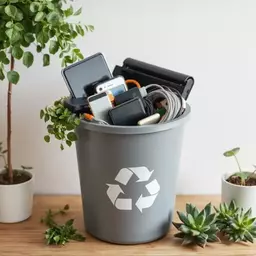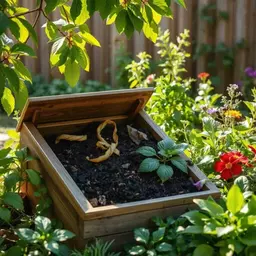What if the decisions you make every day could significantly impact the planet? Mindful consumption isn't just a trend; it's a vital approach to living sustainably and fostering a low-waste lifestyle. By understanding how our choices affect the environment, we can pave the way for a healthier future.
What You Will Learn
- Mindful consumption involves being aware of the environmental and societal impacts of our purchasing habits.
- Key principles of sustainable living include reducing, reusing, recycling, and educating others about sustainability.
- Conscious consumerism empowers individuals to support ethical brands and local businesses, fostering community and sustainability.
- Understanding the environmental impacts of waste helps motivate changes in consumption habits, leading to less pollution and resource depletion.
- Adopting a low-waste lifestyle brings personal benefits such as financial savings, community building, and increased awareness of our ecological footprint.
- Engaging in mindful consumption creates a ripple effect that can influence businesses to adopt greener practices and contribute to social justice.
Key Aspects of Mindful Consumption and Sustainability
Understanding the principles of mindful consumption can help foster a more sustainable lifestyle. Below are critical aspects and their connections to sustainability represented visually.
Awareness
Recognizing the environmental impact of our choices leads to informed decision-making.
Intentionality
Prioritizing sustainably made and packaged products helps to reduce waste.
Responsibility
Understanding our role in waste generation inspires proactive steps to reduce it.
Reduce
Cutting down on purchases conserves resources and minimizes waste.
Finding new uses for items helps divert waste from landfills.
Recycle
Properly sorting materials for recycling conserves resources and energy.
Understanding Mindful Consumption and Its Role in a Low-Waste Lifestyle
Mindful consumption is all about being conscious of our choices and their impacts on the world around us. At Eco Habits Daily, I believe that by understanding our consumption patterns, we can make better decisions that contribute to a low-waste lifestyle. This journey starts by recognizing what mindful consumption truly means and how it interlinks with the principles of zero waste living.
So, what does it mean to live mindfully? It goes beyond just recycling; it involves a holistic approach to our everyday choices. By prioritizing sustainability in our purchases, we take a step towards a healthier planet, ensuring that our habits align with our values of care and respect for the environment. Learn more about mindful eco-friendly living tips to guide your journey.
Defining Mindful Consumption and Zero Waste Living
Mindful consumption is the practice of being aware of how our buying habits affect the environment and society. In contrast, zero waste living aims to reduce waste to the bare minimum by rethinking and reshaping our consumption habits. Together, these concepts encourage us to embrace a lifestyle that minimizes our ecological footprint and promotes sustainability.
By focusing on what we truly need and making conscious purchasing decisions, we can contribute to a more sustainable future. Here are some key aspects to grasp:
- Awareness: Recognizing the environmental impact of our choices.
- Intentionality: Prioritizing products that are sustainably made and packaged.
- Responsibility: Understanding our role in waste generation and taking proactive steps to reduce it.
Key Principles of Sustainable Living
Sustainable living revolves around a few core principles that guide us toward a more eco-friendly lifestyle. Embracing these principles can lead to lasting changes in how we consume and live. Here are some important tenets:
- Reduce: Cutting down on what we buy and consume.
- Reuse: Finding new uses for items instead of discarding them.
- Recycle: Properly sorting materials to be processed and reused.
- Educate: Learning about sustainability and sharing knowledge with others.
By integrating these principles into our daily lives, we can work towards a culture that values sustainability over excess.
Environmental Impact of Waste Generation
The reality of waste generation is staggering. Each year, millions of tons of waste end up in landfills, polluting our environment. Understanding the consequences of our waste can motivate us to change our habits. Here are some critical facts about waste and its environmental impact:
- Landfills: They can release harmful gases and toxins into the surrounding areas.
- Wildlife: Animals often ingest plastic and other materials, leading to injury or death.
- Resource Depletion: Producing new items from raw materials consumes energy and contributes to deforestation.
Recognizing these impacts can strengthen our commitment to mindful consumption and inspire us to make better choices that benefit the planet. For more information on minimizing your environmental footprint, explore our eco-friendly junk removal guide.
Conscious Consumerism: A Pathway to Sustainability
Conscious consumerism is a journey toward aligning our purchasing decisions with our values. By choosing ethically produced goods, we not only support the environment but also contribute positively to society. This shift in mindset is crucial for anyone looking to adopt a low-waste lifestyle.
As part of Eco Habits Daily, I encourage individuals to explore the importance of ethical consumerism and the benefits of choosing eco-friendly products. Here’s how you can begin:
- Research Brands: Look for companies that prioritize sustainability in their practices.
- Support Local: Choose local businesses that promote eco-friendly products.
- Be Informed: Read labels to understand the ingredients and materials used in products.
Understanding Ethical Consumerism and Its Importance
Ethical consumerism is about making informed choices that reflect our values. By supporting businesses that prioritize sustainability, we can help create a market that values eco-friendly practices. This not only reduces waste but also encourages companies to adopt greener practices.
Here are some key reasons why ethical consumerism is essential:
- Empowerment: As consumers, we have the power to influence businesses through our choices.
- Community Support: Purchasing from local businesses can strengthen our communities.
- Positive Change: Supporting ethical brands can lead to a broader shift towards sustainability.
Choosing Eco-Friendly Products and Ethical Brands
When selecting products, it’s vital to look for those that are designed with the environment in mind. By prioritizing eco-friendly options, we can minimize waste and promote better practices in the marketplace. Here’s what to consider when choosing sustainable products:
- Material Matters: Look for products made from recycled, organic, or biodegradable materials.
- Packaging: Choose items with minimal or compostable packaging.
- Transparency: Opt for brands that are open about their sourcing and manufacturing processes.
These choices can have a significant impact, helping to create a cleaner and healthier planet.
Why Mindful Consumption Matters for Our Planet
Mindful consumption isn't just about personal choices; it's about understanding how those choices affect our world. By recognizing the connection between our actions and environmental consequences, we can forge a path toward sustainability. At Eco Habits Daily, I see the ripple effect of individual actions leading to collective change!
Here are some reasons why mindful consumption is essential for our planet:
- Resource Conservation: Decreasing consumption helps preserve natural resources.
- Less Pollution: Reducing waste leads to cleaner air and water.
- Healthier Ecosystems: Fewer pollutants support biodiversity and ecosystem health.
Connecting Personal Choices to Global Consequences
Every decision we make has a ripple effect on the planet. When we choose to consume mindfully, we contribute to a healthier environment. This connection between personal actions and global consequences is a powerful motivator for change!
Here are some ways our choices impact the world:
- Carbon Footprint: Every product has a carbon footprint based on its production and transportation.
- Waste Generation: Our consumption habits determine how much waste we contribute.
- Social Responsibility: Supporting ethical brands can uplift communities and promote fair labor practices.
Benefits of a Low-Waste Lifestyle for Individuals and Communities
Living a low-waste lifestyle has benefits that extend beyond environmental health; it can improve our quality of life and foster stronger communities. By embracing mindful consumption, we can enjoy a range of advantages that enrich our lives and those around us.
Benefits include:
- Financial Savings: Reducing unnecessary purchases saves money.
- Community Building: Engaging in local initiatives fosters connections.
- Increased Awareness: Mindful living promotes a deeper understanding of our impact on the world.
By adopting these practices, we can create a more sustainable, supportive, and thriving community for all. For more practical ways to implement these changes, explore simple low-waste lifestyle tips.
Quick Summary
Here's a brief recap of the key points discussed so far:
- Mindful consumption emphasizes conscious choices and their impacts on the environment.
- Zero waste living focuses on minimizing waste through intentional purchasing and responsible habits.
- Embracing sustainable principles like reducing, reusing, and recycling can lead to lasting change.
- Every individual action contributes to a healthier planet and encourages ethical consumerism.
Frequently Asked Questions About Mindful Consumption & Low-Waste Living
Summarizing the Impact of Mindful Consumption on Sustainability
As we reflect on the importance of mindful consumption, it’s essential to recognize its profound impact on sustainability. By making conscious choices, we can cultivate a low-waste lifestyle that not only benefits us but also the environment. Implementing mindful habits can lead to long-lasting changes that empower individuals and communities alike to embrace a more sustainable future!
The long-term benefits of adopting a low-waste lifestyle are both fulfilling and necessary. When we commit to reducing waste, we contribute to a healthier planet, create economic opportunities, and promote social justice. By prioritizing sustainability, we set a positive example for future generations, ensuring they have access to a thriving world.
The Long-Term Benefits of a Low-Waste Lifestyle
One of the most significant aspects of mindful consumption is its connection to social justice and economic accessibility. When we make intentional purchasing decisions, we support ethical brands and businesses that prioritize fair labor practices and sustainable sourcing. This creates a ripple effect, encouraging more companies to adopt responsible practices, which benefits everyone.
Moreover, reducing waste leads to substantial environmental benefits for future generations. Each small action we take contributes to cleaner air, water, and soil. Our efforts to minimize waste help protect natural habitats and preserve resources for those who come after us. Together, we can create a sustainable world that thrives on the principles of respect and responsibility. To further enhance your efforts, consider exploring ways to minimize plastic in daily life.
- Support ethical brands and businesses.
- Encourage responsible practices in your community.
- Inspire future generations to prioritize sustainability.
Encouraging Action Towards Mindful Consumption
Ready to embark on your journey toward a low-waste lifestyle? It’s easier than you might think! Start with simple steps that can lead to significant changes in your consumption habits. By gradually integrating these practices into your daily routine, you’ll find that mindful consumption becomes second nature.
Here are some straightforward steps to kickstart your journey:
- Assess your current habits and identify areas for improvement.
- Make a commitment to reduce single-use plastics.
- Explore local, sustainable options for shopping.
- Engage in community discussions about sustainability.
- Share your journey on social media to inspire others!
Creating a supportive network is equally crucial. By connecting with like-minded individuals, you can share resources, experiences, and encouragement. Remember, at Eco Habits Daily, we strive to foster a community dedicated to sustainable living, and we invite you to be a part of it!
Engaging with Our Community on Mindful Consumption
Your journey toward mindful consumption is unique, and we want to hear about it! Sharing your experiences can inspire others to take action and make meaningful changes in their lives. We encourage you to join the conversation and let your voice be heard!
Join the Conversation: Sharing your Mindful Consumption Journey
At Eco Habits Daily, we value your stories and insights. Feel free to contribute testimonials that highlight your challenges and victories in adopting mindful consumption habits. Your journey can serve as a guiding light for others looking to embrace sustainability.
Engaging with our community can foster personal growth and inspire change. Together, we can cultivate a culture of sustainability that resonates throughout our lives and beyond!
Resources for Continued Learning and Engagement
To further support your journey toward mindful consumption, here’s a list of valuable resources:
- Books: "Zero Waste Home" by Bea Johnson, "The Story of Stuff" by Annie Leonard
- Websites: EcoHabitsDaily.com, TheMinimalists.com
- Organizations: The Zero Waste Collective, The Surfrider Foundation
Additionally, consider participating in local sustainability initiatives. From community clean-ups to workshops on regenerative agriculture, there are endless opportunities to engage and contribute. Together, let’s create a brighter, more sustainable future for all! Discover more ideas for embracing a low-waste life.
Always remember, each action counts. With every small step, we collectively make a significant impact on our planet, paving the way for a healthier world.
Recap of Key Points
Here is a quick recap of the important points discussed in the article:
- Mindful Consumption: Be aware of the environmental and societal impacts of your purchasing decisions.
- Sustainable Living Principles: Embrace the core principles of reducing, reusing, recycling, and educating others about sustainability.
- Conscious Consumerism: Align your purchasing choices with your values by supporting ethical brands and local businesses.
- Environmental Impact Awareness: Understand the consequences of waste generation on wildlife and natural resources.
- Benefits of a Low-Waste Lifestyle: Experience financial savings, community building, and increased awareness of your ecological footprint.










